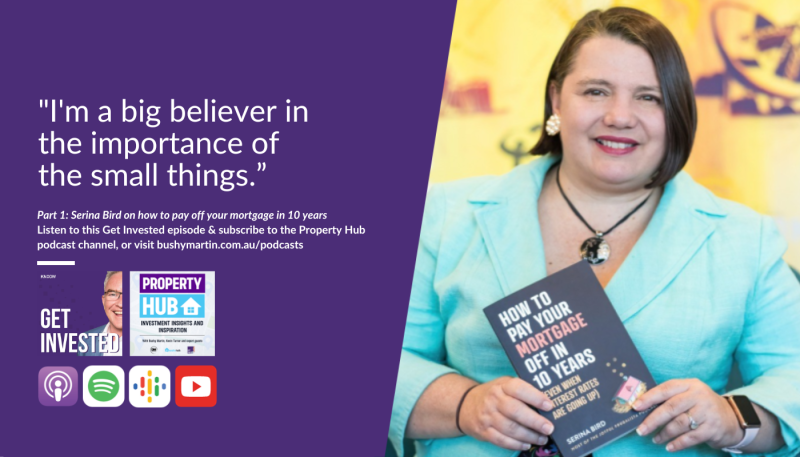Serina Bird says assessing spending habits, being frugal and cutting costs will allow investors to pay off their mortgage quicker.
On a recent episode of Property Hub’s Get Invested podcast, KnowHow’s Bushy Martin was joined by finance writer, podcaster and author Serina Bird to discuss how investors and home owners can adjust their lifestyle to pay off their mortgage quickly.
The author of How To Pay Off Your Mortgage In 10 Years and The Joyful Frugalista revealed the little everyday costs that have a large impact, while also expressing the need to balance between being frugal and living a life of value.
“When I say frugal lifestyle, I mean I’m really big on saving money, but I’m also really big on having a life. So I try and do things where I can cut costs and live more sustainably, but I also think more critically about the things that bring value to me and value for my kids,” Serina said.
Why you need to monitor your spending
For Serina and Bushy, a key quality of a successful investor is their ability to monitor their spending.
“One of the key characteristics is knowing how much money is coming in and how much is going out. And it’s understanding that there’s a lot of psychology around that because it’s hard to admit you’re spending too much. It’s easy to blame your partner and it have nothing to do with you being an enabler, or you spending more on other things,” Serina said.
“It’s really monitoring that, and doing it with love and without judging yourself too hardly. It’s asking, well do I really need that subscription? Do I really need this? Or saying, this was a bit of an expensive month, maybe next month we’ll have a more lean month. So just really knowing and noticing what’s going and what’s coming out.”
Why you need to consider your habitual spending
The first cost-cutting avenue is to assess your habitual spending habits, no matter how small they may seem.
“It’s about habitual discretionary spending … Is it coffee every morning at the local coffee store? Is it the takeaways on Friday? Is it buying bottled water, because Australians are the second largest consumers of bottled water in the world, even though we have really safe drinking water. Is it getting in your car and driving somewhere rather than walking? What are the things that you’re regularly doing that are discretionary expenses you can look at and you can cut out?” Serina said.
Why the little things matter
Serina advised the key to successful money management is to be intentional and mindful.
“I’m a big believer in the little things. You know, there’s that old fashioned saying of watch the pennies and the pounds will take care of themselves. So it really is quite important because it’s both habits and the fact that it’s less easy to be bamboozled by a get-rich-quick scheme when you’re used to being really mindful of small amounts. It could be as simple as saying, no I won’t have that $5 coffee because I’m saving for this. So I’m a big believer in the importance of the small things,” she said.
“We also have to have that abundance mindset to believe that we are worthy of things and fixes. When you’re so focussed on savings dollar here or $2 there, you might be so in that mindset that you don’t put yourself forward to apply for a promotion at work, or you might feel too scared to put that deposit on a property that’s going to really be worth it in the long run. So it’s looking after the small things, but also having a big vision as well.”
Some easy wins to reduce your spending
Cooking
Serina gave insight into her $100 and $50 weekly grocery challenges.
“I do this challenge not because we are starving necessarily, but it’s actually to reduce our waste. Plus I like cooking, and over time I’ve developed quite a lot of frugal cooking hacks and in the past I have shared a lot of budget recipes. I make my own kombucha, I make my own yoghurt and I’m starting the veggie patch. So there are certainly a lot of ways that you can eat within a budget and be more mindful of your food and your waste,” she said.
Transport
Eliminating a second car or finding alternate modes of transportation can have surprisingly large benefits over time.
“In the past, I’ve calculated roughly that having a second car, even if you don’t drive it, was somewhere between $160 and $180 a week just by having it sit there and not do anything. And if you’re actually using it regularly and you’re driving long distances then it’s even more, especially with the cost of petrol going up a lot in recent months. So even driving a car is very expensive now,” Serina said.
“So just by switching to walking, cycling, or using public transport, you can save a fortune. So I mean if you need two cars, that’s fine. But if you don’t, just really think about it and question what’s it doing in your garage? And if you’re not using it, consider renting it out because there’s lots of platforms we can reach that either rent out your car space or rent out your car.”
Listen to the full interview here.
Want to Know How you can build wealth and optimise your property finance with the help of leading, qualified experts? Check us out and talk to the team, now.




